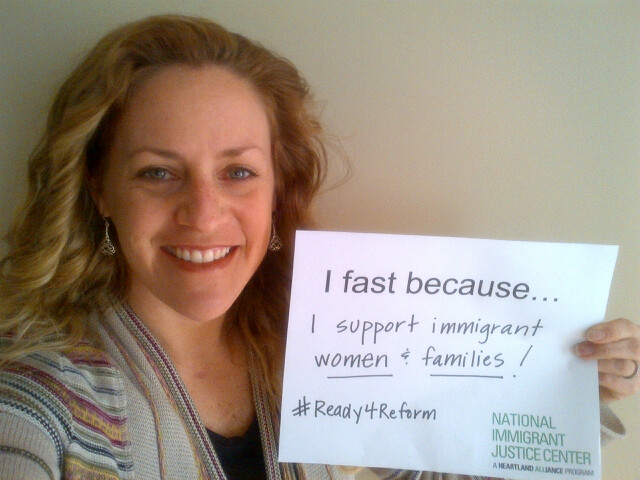 I’m hungry.
I’m hungry.
Today, I join advocates for immigrant survivors of violence across the country in a 24-hour fast to call attention to the need for immigration reform and an end to deportations that separate families. It’s a symbolic but meaningful gesture for one day that acknowledges the hardships millions of our neighbors experience every day.
I stand in solidarity with immigrant women like I stood with members of the House of Representatives last week on the cold, snowy steps of the U.S. Capitol demanding action on a discharge petition to advance immigration reform. The frustration was palpable. Speaker John Boehner (R-OH) has refused to allow a vote on the House floor of either H.R. 15 (the bipartisan House bill that largely mirrors S. 744, the immigration bill that passed the Senate last June) or any of the House immigration bills passed out of committee. But it was Representative Steven Horsford (D-NV) who caught my attention on the Capitol steps when he passionately spoke about immigrant victims of domestic violence who endure abuse at the hands of their partners and then again at the hands of immigration enforcement. He told the story of an undocumented woman in Nevada who was terrorized by her abusive husband for years. When she finally established her independence and demanded her husband pay child support, he made good on his long-promised threat to call immigration authorities. The woman was imprisoned in immigration detention for four weeks, separated from her son, until members of Congress intervened and called for her release.
Sadly, that woman is not alone. NIJC’s client, Juanita*, lives in rural Illinois with an abusive U.S. citizen husband and three U.S. citizen children. Years ago her husband badly beat her while she was pregnant. She called the police but was reluctant to press charges because she feared she would be deported and separated from her children. Another NIJC client, Elena*, and her children were physically and sexually abused by her lawful permanent resident husband who threatened to kill them and have them deported. It is always difficult for survivors of violence to come forward, but these women would have had a better chance of seeking the help and refuge they so desperately needed if they were not also worried about their undocumented status.
Women and families across America need immigration reform to come out of the shadows and live a life of self-sufficiency and safety. Reforms must be based on core principles that minimize vulnerabilities and enable survivors of violence to trust and cooperate with law enforcement agencies. Changes to immigration enforcement that reflect a respect for family unity and value the equities and contributions of noncitizens in this country are long overdue. Communities struggle when families are torn apart and people are victimized. Surely, Congress can agree on commonsense reform around these bipartisan values.
Today’s fast for immigrant women and families is short, but when it ends tomorrow morning, I’ll still be hungry – for action and reform.
*Pseudonyms used to protect individuals’ identities
Royce Bernstein Murray is director of policy at the National Immigrant Justice Center and is located in NIJC’s Washington, D.C., office.

